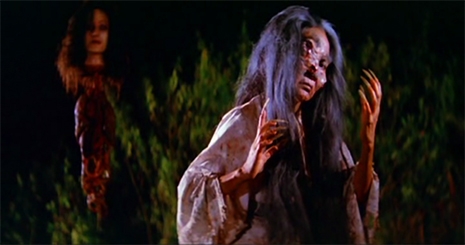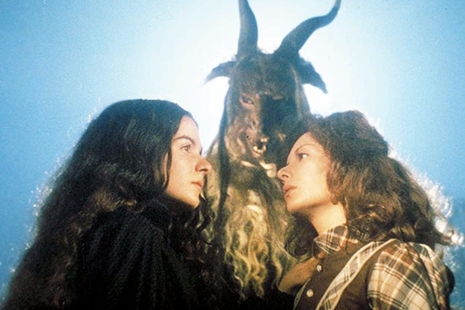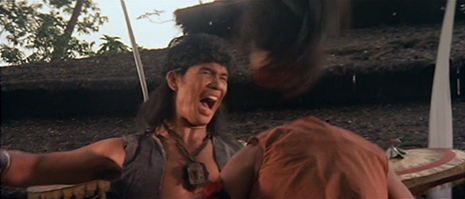
The films released by the Mondo Macabro label are certainly some of the most bizarre movies in existence. Many of these diverse horror, fantasy, and erotic films had never been screened outside of their home countries before being rescued and preserved by these cult curators. The label’s aesthetic, if there is one, seems to favor films with wild visual content resulting from either the film-makers’ budgetary constraints or the unconventional elements of story-telling specific to their various foreign cultures. There are few DVD companies as reliable as Mondo Macabro: even the “bad” films they release are fascinating for being so goddamn out there.
In 1994 Mondo Macabro’s Pete Tombs co-wrote the definitive guide to European exploitation and horror films, Immoral Tales: European Sex & Horror Movies, 1956-1984. This reference lead to Tombs becoming a producer, with Andrew Starke, of the BBC documentary series Eurotika!. Tombs followed up with the book Mondo Macabro: Weird and Wonderful Cinema Around the World, which covered the fantastically strange films of Hong Kong, the Philippines, Indonesia, India, Turkey, Brazil, Argentina, Mexico, and Japan. This crucial tome inspired another BBC documentary series and eventually a DVD label of the same name. Tombs and Starke have been releasing DVDs on the Mondo Macabro label since 2003’s release of the 1978 Mexican horror film, Alucarda.

Alucarda
Tombs scours the planet for the rarest and weirdest exploitation and horror films. In some cases, these films are literally being saved from the garbage dump, with Tombs tracking down the only surviving elements, which are cleaned up as much as possible and supplemented with bonus archival and documentary materials. Mondo Macabro’s DVD releases are an evident labor of love.
We recently caught up with Pete Tombs to talk about his work:
Dangerous Minds: I’d like to start by going back to 1994 and your Immoral Tales book. This book became one of the definitive guides for film buffs with an interest in unusual films in those pre-Internet and DVD days. It had a spot on my bookshelf right next to Incredibly Strange Films and The Psychotronic Encyclopedia of Film. How difficult was it to research your subject matter at that time?
Pete Tombs: It was REALLY difficult! Obviously I’d been watching films for a long time before starting work on the book and so there were my memories and occasionally notes made years before to fall back on, but generally finding copies of the more obscure films was… well, let’s say “challenging”! Most of the research for Immoral Tales was done in a period prior to the existence of the world wide web as it exists today so we relied almost entirely on personal contacts and snail mail to exchange information and tapes. There were also a few books, mostly in languages other than English, and a lot of journals and fanzines that dealt with our areas of interest. In the back pages of zines like Pyschotronic you used to find full page ads from tape traders or sellers, usually pages filled with film titles in tiny typeface that you had to pore over using a magnifying glass. You then had to cross reference the titles to find out what was actually on offer as different releases of the same films often had alternate titles, particularly if they were foreign films. But gradually you got to see things and patterns started to emerge.
DM: How did Immoral Tales lead to the Mondo Macabro book, and subsequently the Eurotika TV series, followed by the Mondo Macabro TV series?
PT: Cathal Tohill and myself put Immoral Tales together, originally for publisher Paul Woods. We ended up publishing it ourselves. After it came out Paul suggested to me that a similar book on Asian cinema might be of interest. I thought about it and realized very quickly that my knowledge of that area of film was limited but I reckoned that by taking a more global approach and intending the book to be a brief introduction to exploitation industries outside Europe and the US, I might be able to put something together.
Andy Starke and myself had already made the Eurotika! Series for UK Channel 4, so we made a video pitch to them of the Mondo series backed up by the book and it went on from there. It was quite an adventure going to all those countries and trying to track down people to film, some of whom had never been interviewed before but I’m glad we did it. Some of those interviews – like the one we did with Barry Prima in Jakarta were kind of surreal. He didn’t seem to be at all interested and could barely come up with answers to most of the questions. Finally he admitted that he thought his films were all shit and that he’d only turned up so he could see who these idiots were who’d come all the way from the UK to ask him about them. What a guy! I still love his films though, despite his best efforts to persuade me otherwise.

Barry Prima in The Devil’s Sword.
DM: At what point did it seem a logical next step to create a label to release the films you were researching and reporting on?
PT: I’d been running video companies for a few years by the time we started the Mondo label. We’d built up a lot of contacts over the years, so we knew who to talk to and (more importantly!) how much to spend. We started in the UK and it was Andy Starke’s idea to set up a US operation.
More after the jump…





